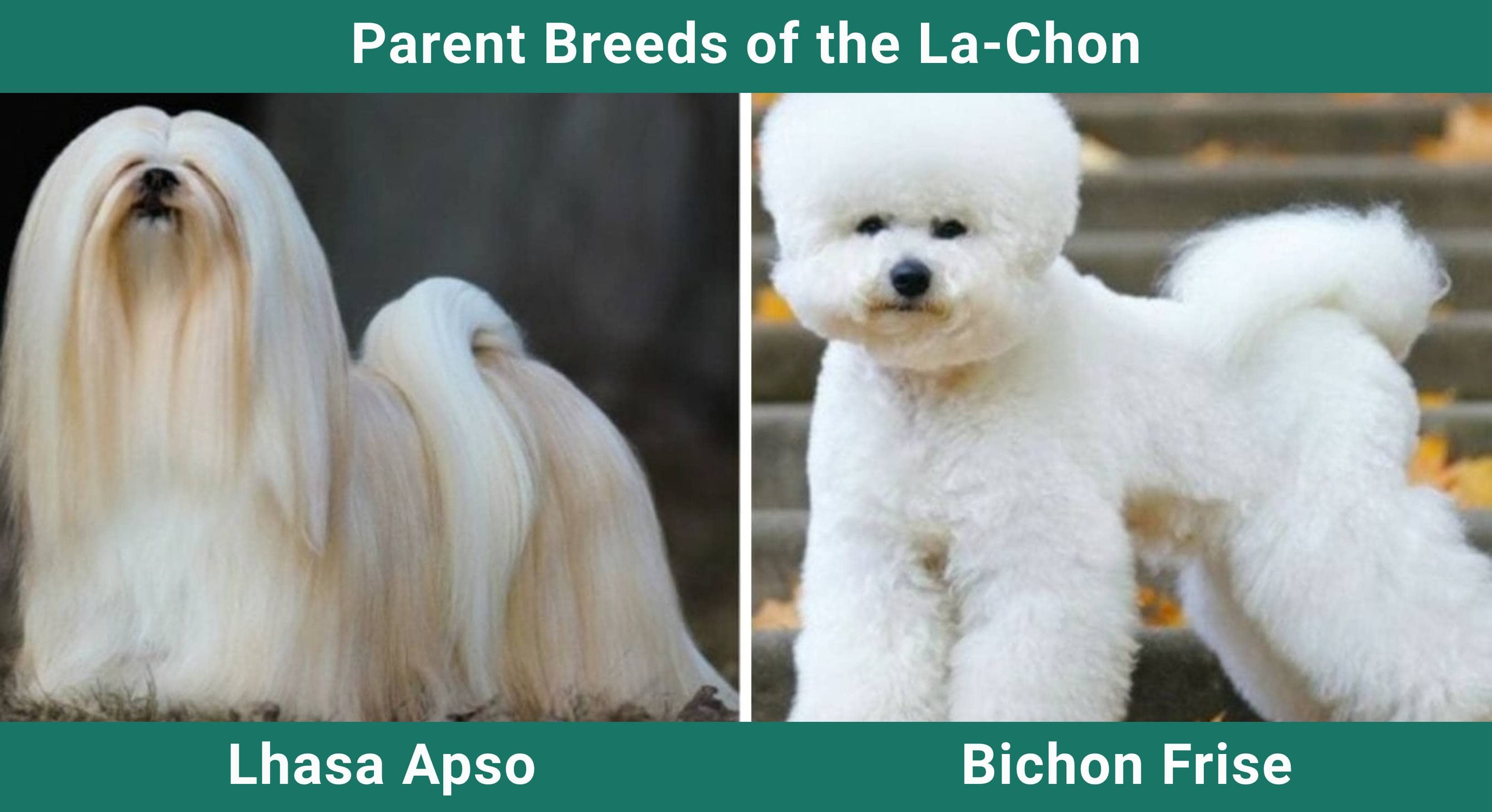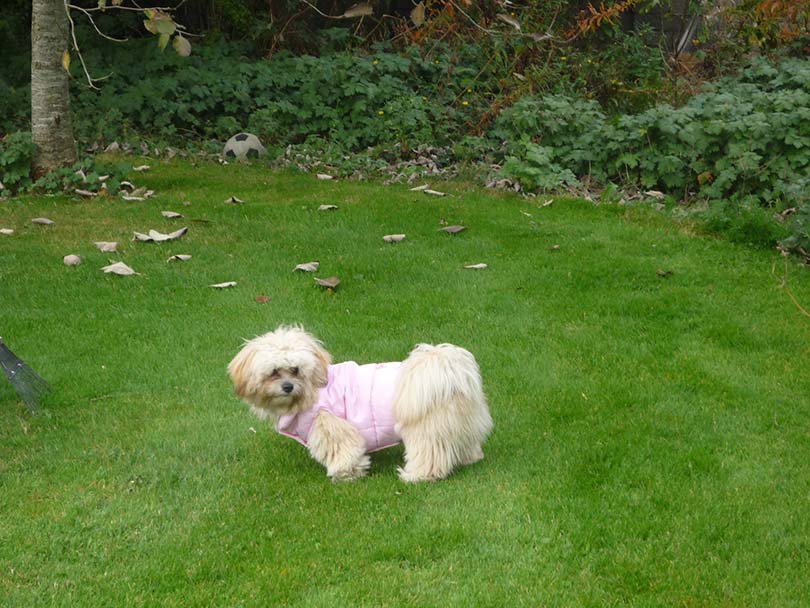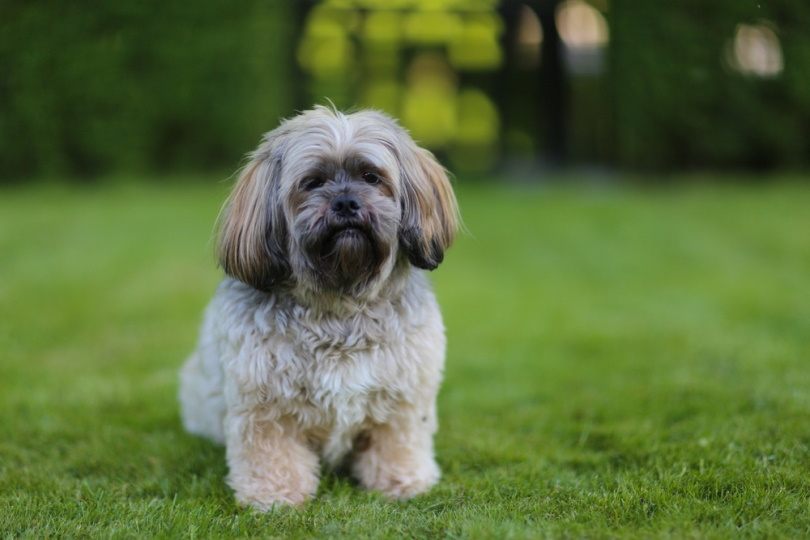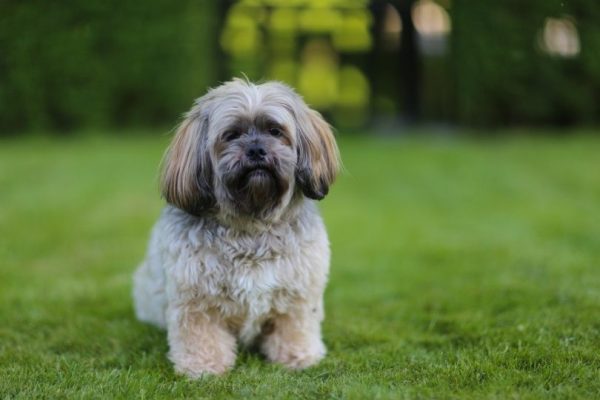Click Below to Skip Ahead
If you are looking for a small cotton ball-like dog fiercely attached to its family, the La-Chon could be the pooch of your dreams! Indeed, this mixed dog brings together the characteristics of two breeds highly appreciated by dog lovers: the Lhasa Apso and the Bichon Frise.
Breed Overview
Height:
10-18 inches
Weight:
8-20 pounds
Lifespan:
12-16 years
Colors:
White, blue, cream, brown, black
Suitable for:
Families living in an apartment, those without other dogs
Temperament:
Loyal and loving, intelligent, willful, affectionate, playful, good with children
La-Chons are adorable little animals with wacky and endearing personalities. They don’t shed much hair, adapt well to apartment living, don’t require tons of daily exercise, and bond strongly with their family. However, these designer dogs are sometimes stubborn and don’t always get along well with their other canine companions.

La-Chon Puppies
When choosing the breeder for your La-Chon, you should first do your research to ensure that they follow ethical and high-quality breeding practices. Indeed, there are still too many unscrupulous sellers who sell purebred dogs on the internet at a price that is too good to be true. These animals often come from puppy mills and buying from such places should be avoided at all costs. If you opt for adoption, head over to your local animal shelter to see if they have an older La-Chon. Adoption fees depend on your location.
When you bring home a La-Chon, be ready to have a new loyal, and friendly member of the family by your side. They are very affectionate and will appreciate playtime sessions. They’re also easily trainable if you commit to firm and consistent training sessions.

Temperament & Intelligence of the La-Chon
The La-Chon is a little furball with a big personality. Calm and smart, the La-Chon is very kind, independent, and at the same time very affectionate. He is very loyal to his family, but he is wary of strangers. He learns tricks quickly and loves to be the center of attention, even from toddlers. However, his stubborn little character can be maddening at times, especially when you’re trying to keep him from yapping at the unexpected arrival of a guest.
Are These Dogs Good for Families?
This is a great breed for families, given how much the La-Chon enjoys human contact. A larger family will increase the odds of someone being home to socialize with the pup. In general, the La-Chon makes a wonderful playmate with children, especially if he has been socialized at a young age.
Does This Breed Get Along with Other Pets?
Although they are generally friendly and sociable with cats, the La-Chon can be dominant and impatient with other dogs. Thus, unless you have socialized well with other dogs at the puppy stage, your adult La-Chon could be aggressive towards his congeners. This is why it is often recommended that he be the only puppy in your household. Also, you will need to watch him carefully when you take him to the dog park, as he might want to face dogs that are double his size. Don’t be fooled by its small size; the La-Chon has an imposing personality!
Things to Know When Owning a La-Chon:
Food & Diet Requirements
You must feed your La-Chon with quality kibble, ideally formulated for small dog breeds. About 2 cups of kibble divided into two meals is usually enough, but be careful not to overfeed them. Indeed, this hybrid breed is prone to becoming overweight, and obesity causes many serious health problems in our canine companions, regardless of their size. If in doubt, seek advice from your veterinarian, who will be able to recommend the best food options for your La-Chon.
Exercise
The La-Chon does not need long walks to maintain excellent health. He can be a bit lively around the house at times, but he can easily cope with apartment living if you take him out daily for a walk of at least 30 minutes. If, on top of that, you pay him enough attention and play with him every now and then, that will be more than enough for this little dog.

Training
Training the La-Chon shouldn’t be too much of a challenge, especially if you are consistent, firm, and patient. However, since this little dog is stubborn, it will most likely test your patience more than once. Don’t be discouraged and stay positive. In fact, positive reinforcement is a much more effective training technique than yelling and punishment. Early socialization is also one of the keys to a successful education, which will allow you to have a balanced dog at ease in all types of situations.
Grooming ✂️
The La-Chon does not require excessive grooming, but if it has inherited the longer hair from the Lhasa Apso, it will need a little extra brushing. Thus, you will need to groom it at least two to three times a week and more often during the molting period (however not excessive). If your budget allows, you can also take him at least once a month to a professional groomer, who will pamper him like a little king. Your La-Chon will be delighted with the extra attention, and it will also save you from having to cut its claws yourself.
Health and Conditions
While the Lhasa Apso and Bichon Frise sometimes suffer from devastating health issues, the La-Chon usually inherits the best genetics from both parent breeds. Fortunately, your puppy should not suffer from serious health problems, being quite hardy and resilient. However, there are a few serious and minor health issues that, while manageable, can affect your La-Chon’s quality of life:
- Allergies
- Bladder problems
- Hip dysplasia
- Patellar luxation
- Kidney disease
Male vs Female
La-Chon males and females are relatively similar. The male may be slightly larger than a female, but that depends mostly on his genetics and whether or not he inherited the stockier build of the Lhasa Apso.
3 Little-Known Facts About the La-Chon
1. The La-Chon is extremely loyal to his family.
Even if he can inherit the more dependent side of his parent Lhasa Apso, the La-Chon will still be strongly attached to his family. Small puppies bought from a breeder when they’re very young will adapt quickly to their new home and will form a deep bond with their owner. Moreover, it is not uncommon to see this breed of dog become depressed for a time when he is separated from his family. This is why you must carefully weigh the pros and cons before acquiring one of these endearing little animals because the transition into a new family is likely to be very painful.
2. One of the La-Chon parent breeds is believed to be the reincarnation of lamas.
Some claim that the Lhasa Apso is the reincarnation of lamas (Tibetan priests) who were unable to access nirvana. The Dalai Llamas not only adopted the Lhasa Apso as a pet but also gave it as a gift to his distinguished guests. The Lhasa Apso sent to China was used for the creation of the races of Shih Tzu and Pekingese. Moreover, the Lhasa Apso was used as a pet and also as a guard dog due to its lively nature and loud barking.
3. The grooming of his Bichon Frise parent is particularly demanding.
A Bichon Frise is always white in color. There are no other colors allowed by the breed standard. The Bichon Frise also has, among other characteristics, all-black eyes, a raised tail, and a little curved and a long coat: it can reach 4 inches in length.
Thus, the coat of the Bichon Frise has earned the breed a reputation as one of the most demanding dogs when it comes to maintenance.

Conclusion
This little dog makes a great companion for families as well as for single or older people who want to share their daily life with an adorable plush that does not require too demanding care. The La-Chon, however, is not the best pet to acquire if you already have other dogs in the house. However, this is not an impossible challenge, especially if you educate and socialize your La-Chon from an early age. With a little patience and firmness, you will end up with a well-balanced dog that will get along with everyone in his pack. Besides, who could resist this adorable little face?
See Also:
Featured Image Credit: BIGANDT.COM, Shutterstock








